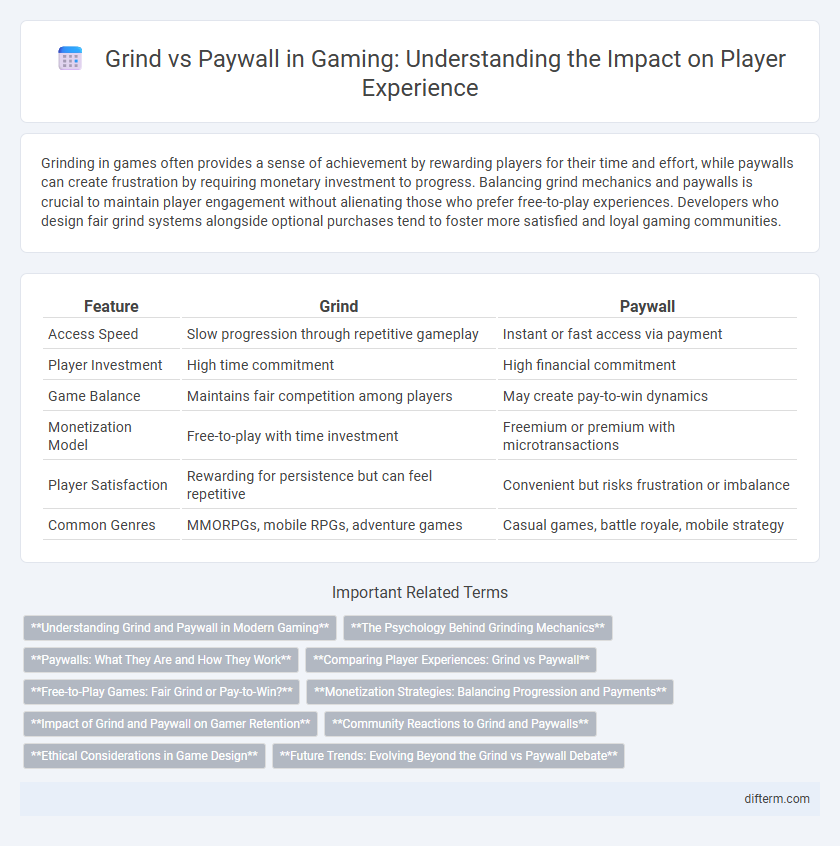Grinding in games often provides a sense of achievement by rewarding players for their time and effort, while paywalls can create frustration by requiring monetary investment to progress. Balancing grind mechanics and paywalls is crucial to maintain player engagement without alienating those who prefer free-to-play experiences. Developers who design fair grind systems alongside optional purchases tend to foster more satisfied and loyal gaming communities.
Table of Comparison
| Feature | Grind | Paywall |
|---|---|---|
| Access Speed | Slow progression through repetitive gameplay | Instant or fast access via payment |
| Player Investment | High time commitment | High financial commitment |
| Game Balance | Maintains fair competition among players | May create pay-to-win dynamics |
| Monetization Model | Free-to-play with time investment | Freemium or premium with microtransactions |
| Player Satisfaction | Rewarding for persistence but can feel repetitive | Convenient but risks frustration or imbalance |
| Common Genres | MMORPGs, mobile RPGs, adventure games | Casual games, battle royale, mobile strategy |
Understanding Grind and Paywall in Modern Gaming
Grind in modern gaming refers to repetitive tasks players perform to progress, often designed to increase player engagement and extend gameplay duration. Paywalls impose financial barriers, requiring players to spend real money to unlock content or bypass lengthy grind. Understanding the balance between grind and paywalls is crucial for game developers aiming to maintain player satisfaction while monetizing effectively.
The Psychology Behind Grinding Mechanics
Grinding mechanics leverage variable reward schedules to trigger dopamine release, reinforcing player engagement through anticipation and intermittent success. This psychological loop exploits the brain's reward system, promoting prolonged gameplay despite repetitive tasks. Contrarily, paywalls disrupt this cycle by replacing effort-based satisfaction with immediate gratification, often altering player motivation and perceived value.
Paywalls: What They Are and How They Work
Paywalls in gaming restrict access to specific content or features until players make a purchase, often requiring real money to progress faster or unlock exclusive items. These systems monetize games by limiting free access, compelling players to either invest time grinding to bypass restrictions or pay directly to enhance their experience. Understanding paywalls is crucial for evaluating game design fairness and the balance between free-to-play and premium content.
Comparing Player Experiences: Grind vs Paywall
Player experiences diverge significantly between grind-based and paywall systems, with grind requiring extended time investment to unlock content, fostering skill development and long-term engagement. Paywall models offer immediate access through microtransactions, appealing to players with limited time but risking perceptions of unfair advantage or "pay-to-win." Analyzing player retention rates and satisfaction scores reveals that balanced hybrids tend to sustain diverse player bases by blending reward-driven progression with monetization.
Free-to-Play Games: Fair Grind or Pay-to-Win?
Free-to-play games walk a fine line between fair grind mechanics and pay-to-win paywalls, often impacting player retention and satisfaction. Games that reward skill and consistent effort without forcing purchases foster long-term engagement and competitive balance. Conversely, excessive paywalls can dilute the gaming experience, creating barriers that favor paying players and undermine fairness.
Monetization Strategies: Balancing Progression and Payments
Monetization strategies in gaming often balance grind-based progression with paywall mechanics to maintain player engagement while generating revenue. Excessive grinding can lead to player fatigue, whereas aggressive paywalls may alienate the user base, impacting retention rates. Successful games employ hybrid models offering optional purchases that accelerate progress without compromising core gameplay satisfaction.
Impact of Grind and Paywall on Gamer Retention
Excessive grind in games often leads to player fatigue, significantly decreasing gamer retention as repetitive tasks diminish long-term engagement. Paywalls can create barriers for free-to-play users, resulting in frustration and potential churn if progression feels locked behind monetary investment. Balancing grind and paywall mechanics is crucial for maintaining an active player base and fostering sustained loyalty.
Community Reactions to Grind and Paywalls
Community reactions to grind and paywalls in gaming reveal a divided player base; many express frustration over excessive grinding that prolongs progress, while others criticize paywalls for creating unfair advantages. Forums and social media highlight debates where fans demand fair balance to keep gameplay engaging without forcing spending. Developers face pressure to adjust mechanics as player feedback increasingly calls for more accessible and rewarding experiences.
Ethical Considerations in Game Design
Ethical considerations in game design emphasize balancing grind mechanics and paywalls to ensure fair player engagement without exploiting time or financial investment. Transparent monetization models foster trust, avoiding predatory practices that coerce players into spending to progress. Designing with player well-being in mind promotes inclusive experiences, reducing frustration and preserving long-term community health.
Future Trends: Evolving Beyond the Grind vs Paywall Debate
Future trends in gaming suggest a shift from the traditional grind versus paywall debate towards more player-centric models emphasizing fair progression and personalized experiences. Advanced AI-driven dynamic content and blockchain-based ownership are enabling gaming economies where skill and creativity surpass mere time investment or microtransaction expenditure. Developers increasingly adopt hybrid systems balancing engagement incentives with monetization strategies to enhance long-term player retention and satisfaction.
grind vs paywall Infographic

 difterm.com
difterm.com